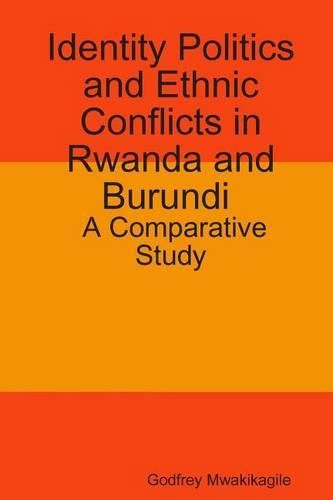Readings Newsletter
Become a Readings Member to make your shopping experience even easier.
Sign in or sign up for free!
You’re not far away from qualifying for FREE standard shipping within Australia
You’ve qualified for FREE standard shipping within Australia
The cart is loading…






This work looks at conflicts between the Hutu and the Tutsi in Rwanda and Burundi. The conflicts between the two groups have sometimes been characterised as ethnic, although neither group has fundamental attributes of ethnicity or ethnic identity which separate one from the other. They have the same culture. They speak the same language. And they have had a common history during the past 400 years. They have intermingled and have intermarried for so long since the Tutsi arrived in the region about 400 years ago that whatever differences existed between them in the past in terms of culture, identity, and biology have been erased. Yet they do exist as distinct social groups. They maintain separate group identities, as Hutus and as Tutsis, mainly because of the asymmetrical relationship between them. Inequity of power has solidified those identities. Historically, the Tutsi minority have been the rulers. Their status as the dominant group was enhanced during colonial rule when the Belgians favoured and recognised them as the traditional rulers, superior to the Hutu, thus legitimising inequalities between the two groups. The differences between them were even given official sanction. And the subordinate status of the Hutu majority was used by the Belgians to justify discrimination against them in terms of employment and educational opportunities while favouring the Tutsi. The conflict between the two groups is rooted in inequity of power, fuelled by stereotypes against the Hutu majority. Domination of the Hutu majority by the Tutsi minority, which started before the advent of colonial rule, has also solidified ethnic identities of the two groups through the years. A shared consciousness among the members of each group and their distinctiveness - each seeing themselves as different from the other - have also played a major role in the evolution and consolidation of these separate identities.
$9.00 standard shipping within Australia
FREE standard shipping within Australia for orders over $100.00
Express & International shipping calculated at checkout
This work looks at conflicts between the Hutu and the Tutsi in Rwanda and Burundi. The conflicts between the two groups have sometimes been characterised as ethnic, although neither group has fundamental attributes of ethnicity or ethnic identity which separate one from the other. They have the same culture. They speak the same language. And they have had a common history during the past 400 years. They have intermingled and have intermarried for so long since the Tutsi arrived in the region about 400 years ago that whatever differences existed between them in the past in terms of culture, identity, and biology have been erased. Yet they do exist as distinct social groups. They maintain separate group identities, as Hutus and as Tutsis, mainly because of the asymmetrical relationship between them. Inequity of power has solidified those identities. Historically, the Tutsi minority have been the rulers. Their status as the dominant group was enhanced during colonial rule when the Belgians favoured and recognised them as the traditional rulers, superior to the Hutu, thus legitimising inequalities between the two groups. The differences between them were even given official sanction. And the subordinate status of the Hutu majority was used by the Belgians to justify discrimination against them in terms of employment and educational opportunities while favouring the Tutsi. The conflict between the two groups is rooted in inequity of power, fuelled by stereotypes against the Hutu majority. Domination of the Hutu majority by the Tutsi minority, which started before the advent of colonial rule, has also solidified ethnic identities of the two groups through the years. A shared consciousness among the members of each group and their distinctiveness - each seeing themselves as different from the other - have also played a major role in the evolution and consolidation of these separate identities.